As the world’s largest continent, Asia houses some of the most popular destinations for mushroom growth, with many countries worshiping Asian mushroom medicinal effects. While China, Japan, and Korea are the most common locations to find these nutritious powerhouses, you can also find various mushroom species worldwide. Over the last thirty years, interest in mushrooms has pivoted to a new audience, gaining the attention of the health and wellness industry in North America and beyond.
This article will address the history of Asian medicinal mushrooms, the assortment of compounds found in them, and how to incorporate a daily mushroom supplement into your routine.
What Are Medicinal Mushrooms?
Simply put, medicinal mushrooms are mushrooms used as medicine. What sets medicinal mushrooms apart from other mushrooms is their higher density of polysaccharides, including beta-glucans which help modulate the immune system (more on this later).‡ Some examples of medicinal mushroom species include the following:
- Lion’s mane
- Reishi
- Turkey tail
- Maitake
- Shiitake
- Cordyceps
- Chaga
If consumed consistently, medicinal mushrooms can provide many benefits. In vitro (laboratory) and in vivo (animal model study) tests and human clinical trials have found that both mushroom extracts and whole mushrooms have extensive therapeutic applications and health benefits, including supporting immune and heart health and blood sugar levels.‡
A Brief History of Medicinal Mushrooms in China
Chinese medicine seeks to restore balance in the body using various techniques, such as Chinese herbs and dietary therapies. These techniques are said to improve quality of life and relieve pain conditions. One of the most notable Chinese medicinal fungal organisms is the mushroom. Traditional Chinese Medicine (TCM) practitioners celebrated the discovery of mushrooms as they found they offered more than just a basic food source.
Once discovered in the wild, practitioners would extract the beneficial properties from mushrooms by boiling them in water and enjoying them as a soup or tea. Ganoderma lucidum, also known as reishi, is one of the most prized species for its plentiful compounds.
Since medicinal mushrooms (also referred to as functional mushrooms) offer more than just simple nutrition, their use was celebrated. Today, you can find them as capsules, powders, and teas.
Asian Mushroom Medicinal Effects: Powerhouse Compounds
It’s no secret that mushrooms contain vast amounts of supportive benefits. As a low-calorie superfood source, Asian mushrooms include hundreds of compounds and minerals alongside dietary fibers. But the extraordinary component of these superfood agents is the polysaccharide. Beta-glucan polysaccharides in particular occur naturally in the cell walls of functional mushrooms and offer immune-modulating effects.‡
Polysaccharides from mushrooms also support better immune health as they bind to receptors that activate our B-cells, T-cells, killer cells, and macrophages.‡ Beta-glucans provide other health benefits, including promoting healthy gut bacteria and supporting weight management.‡
The chart below displays notable compounds found in Asian medicinal mushrooms and the effects they are believed to have.
|
Polysaccharides |
Carbohydrates found in large quantities in mushrooms and other foods |
|
|
Terpenoids |
Bioactive metabolites found in mushrooms and plants. |
|
|
Glycoproteins |
Made up of carbohydrates and proteins and refers to the attachment of amino acids |
|
|
Alkaloids |
Naturally-occurring and nitrogen-containing compound |
|
*Various mushroom species contain many bioactive compounds, minerals, and primary and secondary metabolites that are not listed here.
Mushroom of Immortality: The Effects of Reishi
Reishi is one of the most well-known mushrooms and has the oldest medicinal history of use in Asia. It also grows on trees in temperate forest areas of Europe, Asia, South and North America. It has a shiny exterior with a brown- and red-colored hue and can reach lengths of up to eight inches in diameter.
Reishi is known as “the elixir of life” and contains many beneficial compounds, including polysaccharides and triterpenes—the effects of which support immune health and offer adaptogenic benefits.‡ Adaptogens support the body’s natural response to stress, making reishi a great choice for balancing mental and physical stress.‡
Reishi can be harvested in the wild but can also be grown safely indoors (like we do at Om Mushroom) to prevent exposure to and the accumulation of dangerous toxins and pesticides. Om Mushroom Superfood® offers a Reishi Organic Mushroom Powder blend that can easily be incorporated into recipes, smoothies, coffee, or teas. When consumed daily, it can even offer powerful benefits that support better health.‡ If you prefer even more convenience, you can always try our reishi capsules instead.
[CTA]
‡These statements have not been evaluated by the Food and Drug Administration. Functional mushroom products are not intended to diagnose, treat, cure or prevent any disease.












